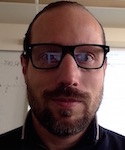
Prof. Marc Baaden
Institut de Biologie Physico-Chimique, France
Title: High fidelity ryanodine receptor reconstruction from cryo-EM data
Abstract:
Advances in Biochemistry and Molecular Biology, in particular
integrative modeling techniques, have ushered in a new era of
understanding large macromolecular assemblies. Unraveling the intricate
dynamics and mechanisms underlying their biological functions requires a
careful synthesis of all available data. To achieve this, we have
developed a modeling pipeline that seamlessly combines automated
processes with hands-on, human-guided expertise. In this presentation, I
illustrate our methodology using the ryanodine receptor, an ion channel
that controls ion flux across the cell membrane and deftly switches
between open and closed states. These transitions require subtle
conformational changes within the receptor, which is a remarkable feat
given the considerable size of the system. The challenge is to
consistently track these states using information from cryo-electron
microscopic structures. We are focusing on interactive, immersive
modeling tools specifically designed to overcome the unique obstacles
encountered in this multi-faceted endeavor. With these innovative
approaches, we aim to shed new light on the mysteries of macromolecular
assemblies and pave the way for a deeper understanding of their
biological significance.
Biography:
Marc Baaden (LBT, UPR 9080) is a senior research director (DR1) at CNRS.
He is currently head of the CNRS UPR9080 Theoretical Biochemistry Unit.
He is co-author of > 120 publications and is known for molecular
dynamics studies on membrane proteins published in Nature, PNAS, PLoS
Comput Biol... , etc. Trained as a physical chemist, his research
focuses on biological systems and phenomena at membranes and interfaces,
where water and ion transport play a special role. He is internationally
known for interactive molecular design approaches with multi-scale
representations using unique in-house software. His research on protein
simulations, bioinformatics, and permeating membrane systems features an
intrinsically interdisciplinary approach. It combines chemistry,
physics, biological sciences, and computer science. In particular
establishing links with new technologies such as virtual reality and
artificial intelligence. He has received several awards in the past and
several of his papers have been recommended by the Faculty of 1000 in
Biology and Medicine.
Webpage: http://www.baaden.ibpc.fr